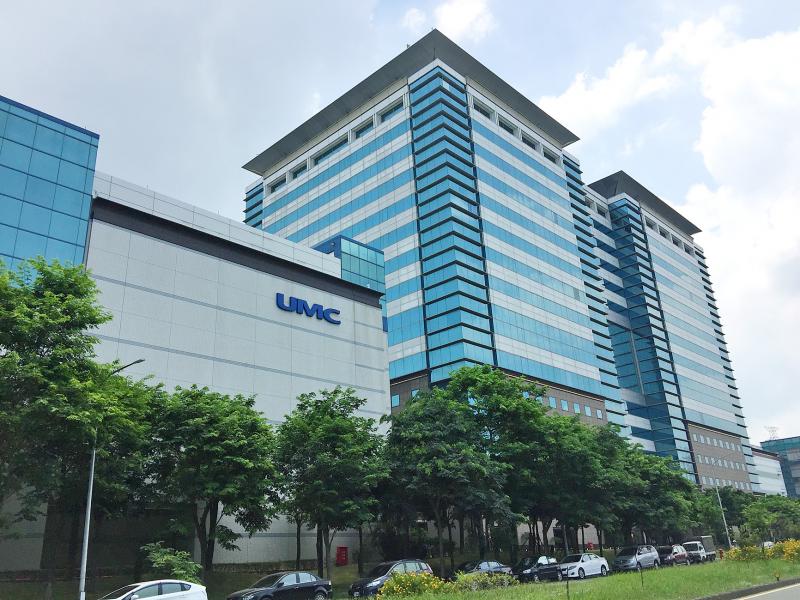United Microelectronics Corp (UMC, 聯電) yesterday saw its share price soar to close at a two-week high on reports that Washington is looking to ban Semiconductor Manufacturing International Corp (SMIC, 中芯) amid an escalating US-China trade dispute.
UMC shares jumped 9.79 percent to NT$23.55, after Reuters on Friday last week reported that the US Ministry of Defense has proposed working with other agencies to determine whether to place SMIC on a trade blacklist because of its relationship with the Chinese military.
US firms would require a license before shipping to SMIC if US President Donald Trump’s administration imposed export restrictions on the Chinese chipmaker.

Photo: Hung Yu-fang, Taipei Times
Turnover of UMC shares hit 97.93 million yesterday, the biggest since Monday last week.
SMIC shares tumbled 22.88 percent to end at H$18.24 on the Hong Kong Stock Exchange.
“In our view, the US curbs will have a positive impact on Taiwan’s semiconductor industry,” if Washington were to put SMIC on the blacklist, Yuanta Securities Investment Consulting Co (元大投顧) said in a note yesterday.
Yuanta expects “UMC to be a major beneficiary from the US’ potential ban,” given the similarities in revenue scale and foundry technology offerings of the two companies, the note said.
UMC ranked as the world’s fourth-biggest foundry last quarter, with revenue of US$1.44 billion, while SMIC had US$941 million in revenue, according to the statistics compiled by market researcher TrendForce Corp (集邦科技).
Both companies offer 14 nanometers as their most advanced process technology, but SMIC generates a large part of its revenue from less advanced chips, TrendForce said.
With Beijing’s support, SMIC is striving to move to next-generation process technologies to catch up with bigger rivals Taiwan Semiconductor Manufacturing Co (TSMC, 台積電) and Samsung Electronics Co. However, the US restrictions would be an obstacle to SMIC’s ambition due to a scant supply of key manufacturing equipment, Yuanta said.
Novatek Microelectronics Corp (聯詠科技), which supplies chips that control flat-panel displays, would be another beneficiary and could see a rebound in its share price, as the US ban would make it difficult for SMIC to tap into the driver IC market, Yuanta said.
Novatek shares have plunged about 15 percent since media reports last month that Huawei Technologies Co (華為) planned to team up with SMIC to make inroads into the driver IC market.
UMC, Vanguard International Semiconductor Corp (世界先進) and GlobalFoundries Inc are likely to receive orders transferred from SMIC if the Trump administration further tightened its grip on SMIC and other Chinese semiconductor companies, Jih Sun Securities Investment Consulting Co (日盛投顧) said in a research note.
Since UMC and Vanguard are running their 8-inch fabs at almost full capacity, they could see an uptick in chip prices amid supply constraints, while UMC and TSMC could see an increase in demand for less advanced chips made by their 12-inch fabs, Jih Sun said.
TSMC and Novatek shares dropped 0.7 percent and 0.82 percent to NT$426 and NT$241 respectively in Taipei trading yesterday. Vanguard shares climbed 2.88 percent to NT$96.50.

SEMICONDUCTORS: The German laser and plasma generator company will expand its local services as its specialized offerings support Taiwan’s semiconductor industries Trumpf SE + Co KG, a global leader in supplying laser technology and plasma generators used in chip production, is expanding its investments in Taiwan in an effort to deeply integrate into the global semiconductor supply chain in the pursuit of growth. The company, headquartered in Ditzingen, Germany, has invested significantly in a newly inaugurated regional technical center for plasma generators in Taoyuan, its latest expansion in Taiwan after being engaged in various industries for more than 25 years. The center, the first of its kind Trumpf built outside Germany, aims to serve customers from Taiwan, Japan, Southeast Asia and South Korea,

Gasoline and diesel prices at domestic fuel stations are to fall NT$0.2 per liter this week, down for a second consecutive week, CPC Corp, Taiwan (台灣中油) and Formosa Petrochemical Corp (台塑石化) announced yesterday. Effective today, gasoline prices at CPC and Formosa stations are to drop to NT$26.4, NT$27.9 and NT$29.9 per liter for 92, 95 and 98-octane unleaded gasoline respectively, the companies said in separate statements. The price of premium diesel is to fall to NT$24.8 per liter at CPC stations and NT$24.6 at Formosa pumps, they said. The price adjustments came even as international crude oil prices rose last week, as traders

Taiwan Semiconductor Manufacturing Co (TSMC, 台積電), which supplies advanced chips to Nvidia Corp and Apple Inc, yesterday reported NT$1.046 trillion (US$33.1 billion) in revenue for last quarter, driven by constantly strong demand for artificial intelligence (AI) chips, falling in the upper end of its forecast. Based on TSMC’s financial guidance, revenue would expand about 22 percent sequentially to the range from US$32.2 billion to US$33.4 billion during the final quarter of 2024, it told investors in October last year. Last year in total, revenue jumped 31.61 percent to NT$3.81 trillion, compared with NT$2.89 trillion generated in the year before, according to

PRECEDENTED TIMES: In news that surely does not shock, AI and tech exports drove a banner for exports last year as Taiwan’s economic growth experienced a flood tide Taiwan’s exports delivered a blockbuster finish to last year with last month’s shipments rising at the second-highest pace on record as demand for artificial intelligence (AI) hardware and advanced computing remained strong, the Ministry of Finance said yesterday. Exports surged 43.4 percent from a year earlier to US$62.48 billion last month, extending growth to 26 consecutive months. Imports climbed 14.9 percent to US$43.04 billion, the second-highest monthly level historically, resulting in a trade surplus of US$19.43 billion — more than double that of the year before. Department of Statistics Director-General Beatrice Tsai (蔡美娜) described the performance as “surprisingly outstanding,” forecasting export growth